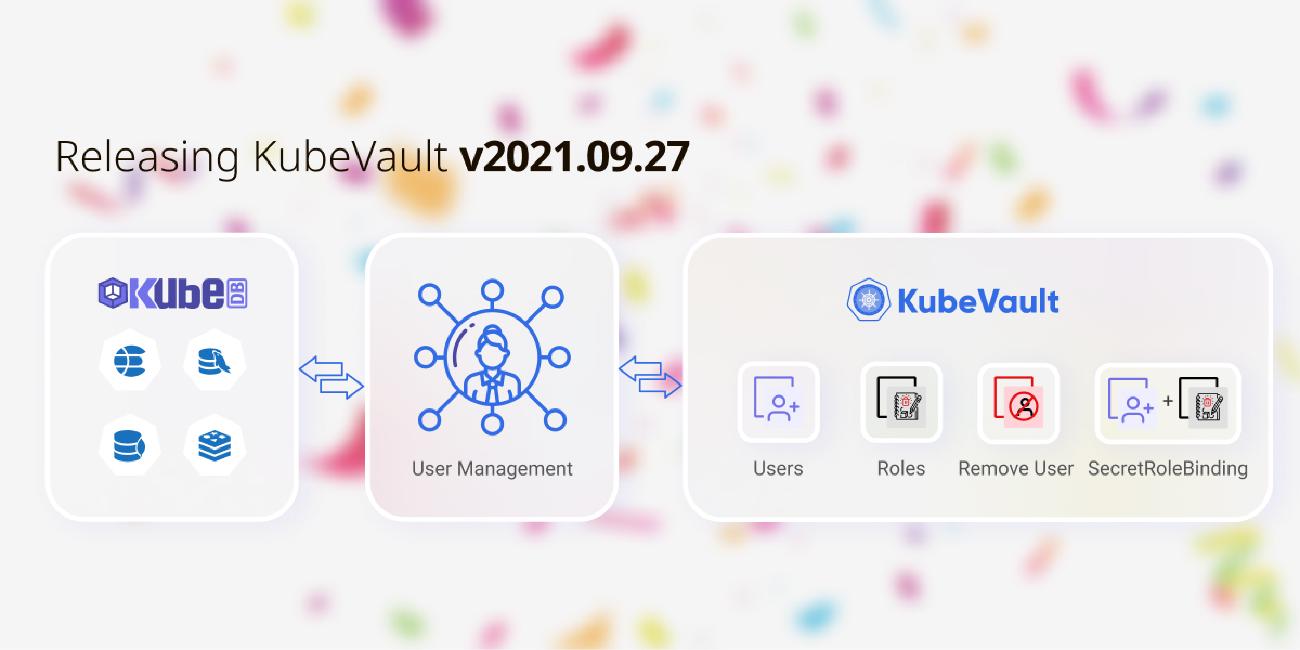
We are very excited to announce the release of KubeVault v2021.09.27 Edition. The KubeVault v2021.09.27 contains major rework of the CRDs for self-service mode usage with KubeDB
or GitOps use-cases. It makes managing user privileges extremely easy for KubeDB managed databases or any other databases as long as users provide necessary connection information.
KubeVault is a Kubernetes operator for HashiCorp Vault . The Vault is a tool for secrets management, encryption as a service, and privileged access management. The KubeVault operator makes it easy to deploy, maintain and manage Vault servers in Kubernetes. It also supports various secret engines management, policy management in the Kubernetes native way.
In this post, we are going to highlight the major changes. You can find the complete commit by commit changelog here .
What’s new in this release?
A more generic SecretAccessRequest
The support for a more generic way to make secret access requests has been added in this release. Now, only the
SecretAccessRequestCRD will be used to make request for all the supportedSecretEngines and roles created in them e.g:GCPRole,AWSRole,ElasticsearchRole,MongoDBRole, etc. instead of separate CRDs e.g:GCPAccessRequest,AWSAccessRequest,DatabaseAccessRequest, etc. Making access request has never been this easy before using KubeVault.kind: SecretAccessRequest metadata: name: aws-cred-req namespace: dev spec: roleRef: kind: AWSRole name: aws-role subjects: - kind: ServiceAccount name: test-user-account namespace: test
SecretAccessRequest has three different phases e.g: WaitingForApproval, Approved, Denied. A credential secret will only be issued if the phase is Approved. An approved SecretAccessRequest.status may look like this:
status:
conditions:
- lastTransitionTime: "2021-09-28T09:36:45Z"
message: 'This was approved by: kubectl vault approve secretaccessrequest'
observedGeneration: 1
reason: KubectlApprove
status: "True"
type: Approved
- lastTransitionTime: "2021-09-28T09:36:49Z"
message: The requested credentials successfully issued.
observedGeneration: 1
reason: SuccessfullyIssuedCredential
status: "True"
type: Available
observedGeneration: 1
phase: Approved
secret:
name: aws-cred-req-92m0n9
namespace: dev
Managing user privilege using SecretRoleBinding
Managing user privilege has been made simpler with the newly introduced
SecretRoleBindingCRD. Now Admin can bind a set ofrolesto a set ofusersto grant them specific privilege usingSecretRoleBinding, and on success of which the KubeVautl operator will create the necessaryVaultPolicyandVaultPolicyBinding.kind: SecretRoleBinding metadata: name: secret-r-binding namespace: dev spec: roles: - kind: AWSRole name: aws-role subjects: - kind: ServiceAccount name: test-user-account namespace: test
A Successful SecretAccessRequest.status with created policyRef and policyBindingRef may look like this:
status:
phase: Success
policyRef:
name: srb-dev-secret-r-binding
namespace: demo
policyBindingRef:
name: srb-dev-secret-r-binding
namespace: demo
observedGeneration: 1
conditions:
- lastTransitionTime: "2021-09-28T12:56:35Z"
message: VaultPolicy phase is Successful
observedGeneration: 1
reason: VaultPolicySucceeded
status: "True"
type: VaultPolicySuccess
- lastTransitionTime: "2021-09-28T12:56:35Z"
message: VaultPolicyBinding is Successful
observedGeneration: 1
reason: VaultPolicyBindingSucceeded
status: "True"
type: VaultPolicyBindingSuccess
- lastTransitionTime: "2021-09-28T12:56:35Z"
message: SecretRoleBinding is Successful
observedGeneration: 1
reason: SecretRoleBindingSucceeded
status: "True"
type: SecretRoleBindingSuccess
VaultPolicy created by a successful SecretRoleBinding will create the necessary policy documents which is shown below:
spec:
policyDocument: |
path "/k8s.-.aws.dev.aws-secret-engine/creds/k8s.-.dev.aws-role" {
capabilities = ["read"]
}
path "/k8s.-.aws.dev.aws-secret-engine/sts/k8s.-.dev.aws-role" {
capabilities = ["create", "update"]
}
vaultRef:
name: vault
VaultPolicyBinding created by a successful SecretRoleBinding will contain the references to the policies and subjects which is shown below:
spec:
policies:
- ref: srb-dev-secret-r-binding
subjectRef:
kubernetes:
name: k8s.-.demo.srb-dev-secret-r-binding
path: kubernetes
serviceAccountNames:
- test-user-account
serviceAccountNamespaces:
- test
vaultRef:
name: vault
vaultRoleName: k8s.-.demo.srb-dev-secret-r-binding
VaultPolicyBinding.spec.vaultRoleName is the role name which will be bound to the policies. This role may be used during the creation of SecretProviderClass
for using the Secrets-store CSI Driver
. This defaults to following format: k8s.${cluster or -}.${metadata.namespace}.${metadata.name}
What Next?
Please try the latest release and give us your valuable feedback. If you want to install KubeVault, please follow the installation instruction from here .
We are going to demo these features in our upcoming webinar on Oct 13, 2021 9:30 AM PST. Please register here to attend!
Support
To speak with us, please leave a message on our website .
To receive product announcements, follow us on Twitter .
If you have found a bug with KubeVault or want to request new features, please file an issue .









